In ecommerce website development, open source platforms continue to empower businesses with flexibility, customization, and cost-effectiveness. As we enter 2024, exploring the top ecommerce open source solutions offering a wealth of features to meet diverse business needs is crucial. From robust online stores to seamless payment integrations, these platforms provide the foundation for building successful online ventures. Ecommerce platforms should implement robust security measures such as encryption, secure authentication mechanisms, and data encryption in transit and at rest.
Aloa, a software outsourcing company, is well-versed in the ecommerce industry and has expertise in developing custom solutions tailored to specific business requirements. With a proven track record in delivering high-quality ecommerce projects, Aloa ensures a seamless and efficient development process for clients seeking open source platforms.
This blog delves into the top ecommerce open source platforms big and small businesses can consider harnessing. By the end, you will gain insights into the diverse array of open source solutions and be equipped to make informed decisions when hiring the right platform for their ecommerce endeavors.
Let’s get started!
Ecommerce Open Source vs. SaaS Ecommerce
When comparing an ecommerce software, businesses often confront the choice between ecommerce open source platforms and Software-as-a-Service (SaaS) options. Open source platforms provide extensive customization capabilities but require technical knowledge and ongoing maintenance. In contrast, SaaS solutions offer convenience with managed hosting and automatic updates but may need more flexibility in customization.
The decision hinges on factors like budget, technical proficiency, and the desired level of control over the ecommerce platform. Ultimately, businesses must carefully evaluate their needs to determine the best fit for their ecommerce strategy.
Best Overall Ecommerce Open Source Platforms
Selecting the best overall ecommerce open source platform is critical for businesses aiming for comprehensive functionality and scalability. It involves considering factors like customization options, performance, and security features. Here are the top ecommerce sites that excel in delivering a well-rounded ecommerce solution for diverse business needs.
1. PrestaShop - Feature-Rich and Scalable Solution
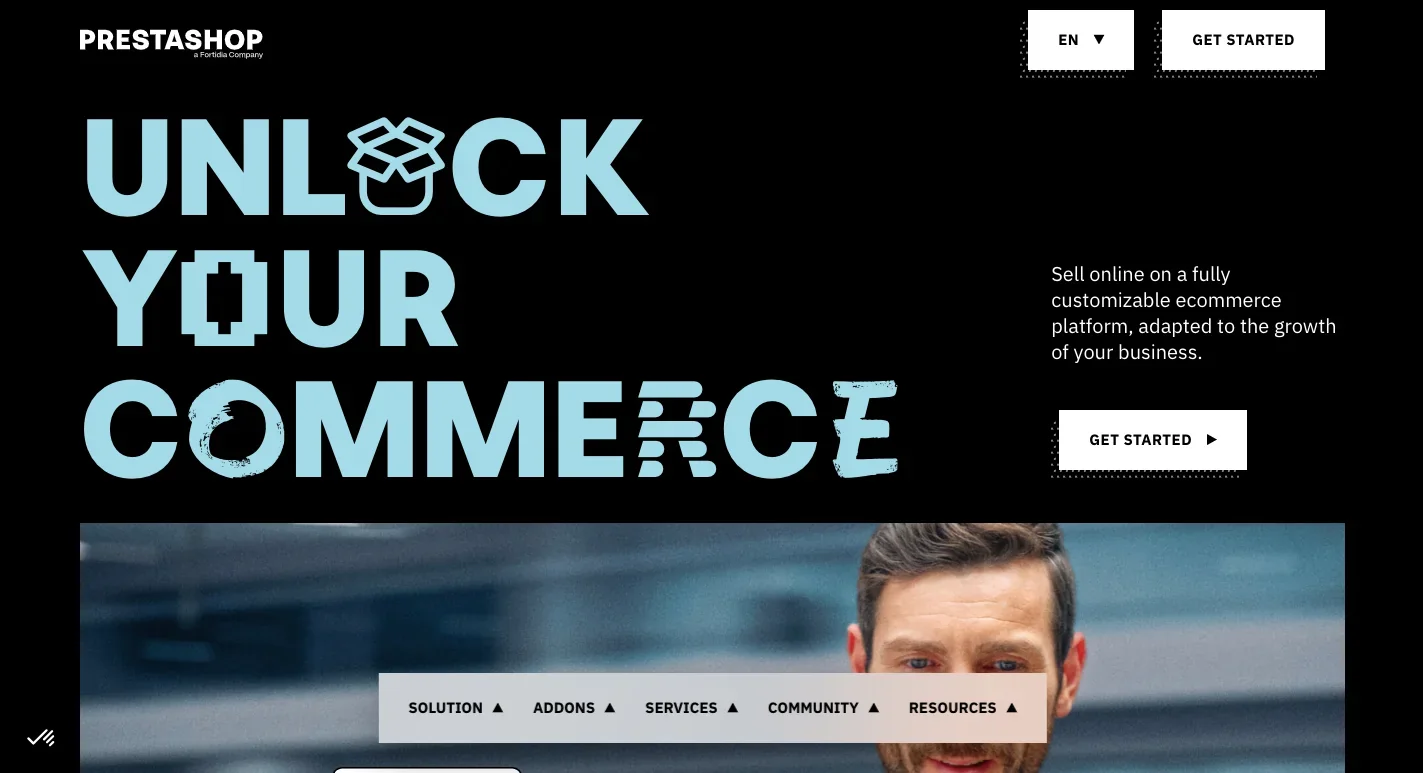
PrestaShop, an ecommerce open source platform, is renowned for its comprehensive solutions for online merchants. With PrestaShop, creating an online store becomes a streamlined process, offering all the necessary features for effective online sales.
One of PrestaShop's unique offerings is its emphasis on empowering merchants with complete control over their online stores and data. With PrestaShop, merchants have full ownership, enabling them to customize their stores to stand out from competitors.
Notable Features of PrestaShop
- Multi-Store Management: PrestaShop allows merchants to manage multiple online stores from a single dashboard, making it easy to expand their e-commerce business and reach new markets.
- Secure Payment Gateways: PrestaShop supports a wide range of secure gateways, allowing merchants to accept payments from customers worldwide while ensuring the security of sensitive payment information.
- Flexible Shipping Options: PrestaShop offers flexible shipping options, including support for multiple carriers, shipping methods, and delivery zones, as well as advanced shipping rules and real-time shipping rate calculation.
- User-Friendly Interface: PrestaShop offers an intuitive and user-friendly interface, making it easy for merchants to set up and manage their online stores without requiring advanced technical skills.
PrestaShop Pricing Plans
PrestaShop offers a compelling pricing plan that aligns perfectly with small ecommerce businesses. As a free-to-download-and-use platform with no monthly fees or commission on sales, PrestaShop ensures your budget stays focused on growth. Whether you're just starting or looking to invest, PrestaShop provides the flexibility to run your online store for free.
2. Adobe Commerce - Robust Enterprise-Grade Platform

Adobe Commerce, formerly Magento, stands out in ecommerce open source platforms with its extensive expertise in providing flexible and scalable solutions for B2B and B2C experiences. With Adobe Commerce, businesses can confidently build a B2B ecommerce platform, empowering users to navigate the complexities of online commerce seamlessly.
What sets Adobe Commerce Community Edition apart is its commitment to offering personalized experiences at scale. Adobe Commerce's integration with Adobe's suite of tools and services provides a comprehensive solution for businesses looking to optimize their online presence and drive growth.
Notable Features of Adobe Commerce
- Extensibility: Adobe Commerce offers extensive customization options through its robust extension marketplace, allowing users to tailor their online stores to specific business needs.
- Integrated B2B Functionality: Adobe Commerce includes built-in features tailored for B2B (business-to-business) transactions, such as custom price negotiation, bulk ordering, and tiered pricing.
- Live Search: Adobe Commerce provides a dynamic and responsive live search feature, enhancing user experience by delivering instant and accurate search results as users type.
- Product Recommendations: Adobe Commerce employs advanced algorithms to provide personalized product recommendations, increasing upselling and cross-selling opportunities for merchants.
Adobe Commerce Pricing Plans
Adobe Commerce offers comprehensive pricing plans to cater to various business needs. Here are the packages available:
- Adobe Commerce Pro: An all-in-one package designed for merchants of any size or business model. It provides comprehensive features and functionalities to support e-commerce operations efficiently.
- Managed Services: Adobe Commerce also offers managed services to decrease risk and minimize business disruptions. With expert-level managed services, businesses can ensure smooth operation and focus on growth without worrying about technical issues.
3. WooCommerce - Seamless Integration with WordPress
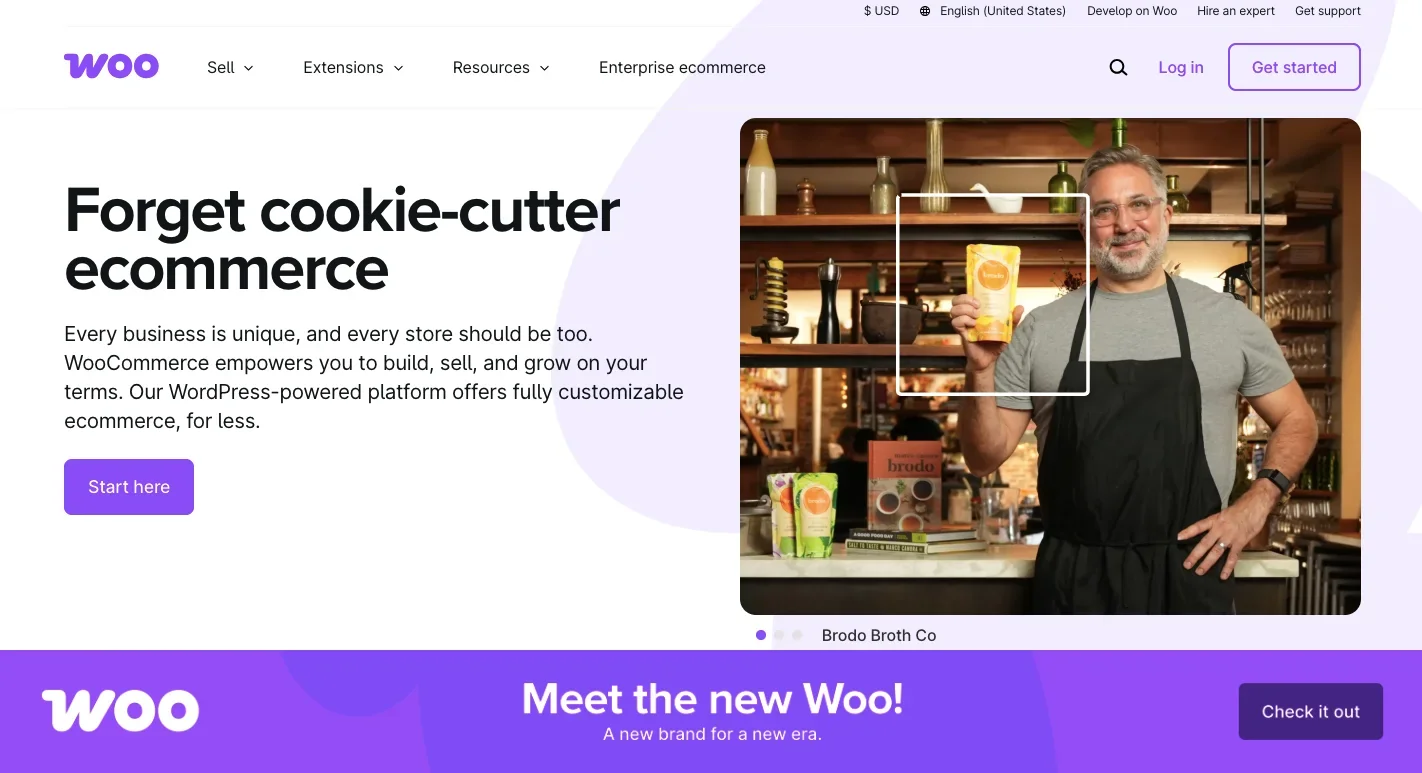
WooCommerce, a WordPress-based ecommerce open source platform and one of the top ecommerce website builders, stands out for its adaptability and scalability, ensuring it evolves alongside businesses of all sizes. Whether merchants are just starting their online journey or are seasoned developers building robust ecommerce solutions, WooCommerce provides the tools and flexibility needed for long-term success.
What truly sets WooCommerce apart is its dedication to empowering businesses without inhibiting their growth. Unlike other platforms, WooCommerce allows merchants to start for free and scale alongside their business without imposing additional charges based on profits.
Notable Features of WooCommerce
- Expert Help with WooCommerce: Merchants can save time, sell more, and stay ahead of the competition by hiring trusted WooExpert agencies to start or optimize their WooCommerce stores.
- Robust Marketplace: WooCommerce's Marketplace offers hundreds of extensions and themes to boost conversion rates and streamline business operations for existing store owners.
- Custom Solutions for High-Volume Stores: WooCommerce provides next-level customization, advanced selling features, and dedicated support to help established merchants with high-volume stores continue growing their businesses.
- Extensibility: WooCommerce's greatest strength lies in its extensibility, allowing for extensive customization and the ability to build almost any feature a store requires—whether it's advanced checkout, payment gateways, or WooCommerce shipping solutions for domestic and international orders.
WooCommerce Pricing Plan
WooCommerce, as a plugin for WordPress, is a free platform to use, offering a robust foundation for your online store. However, to enhance functionality, WooCommerce provides a range of free extensions and add-ons, including WooCommerce Subscriptions, each with its own pricing plans. For businesses seeking cutting-edge performance and ultimate flexibility, partnering with a headless WordPress agency can unlock the full potential of WooCommerce.
Best for Ease of Use and Beginners
Using ecommerce open source platforms can be daunting for beginners, but finding the right user-friendly solution is crucial for a smooth start. Here are the top picks that offer simplicity and ease of use, perfect for beginners diving into online selling:
4. CubeCart: User-Friendly Shopping Platform
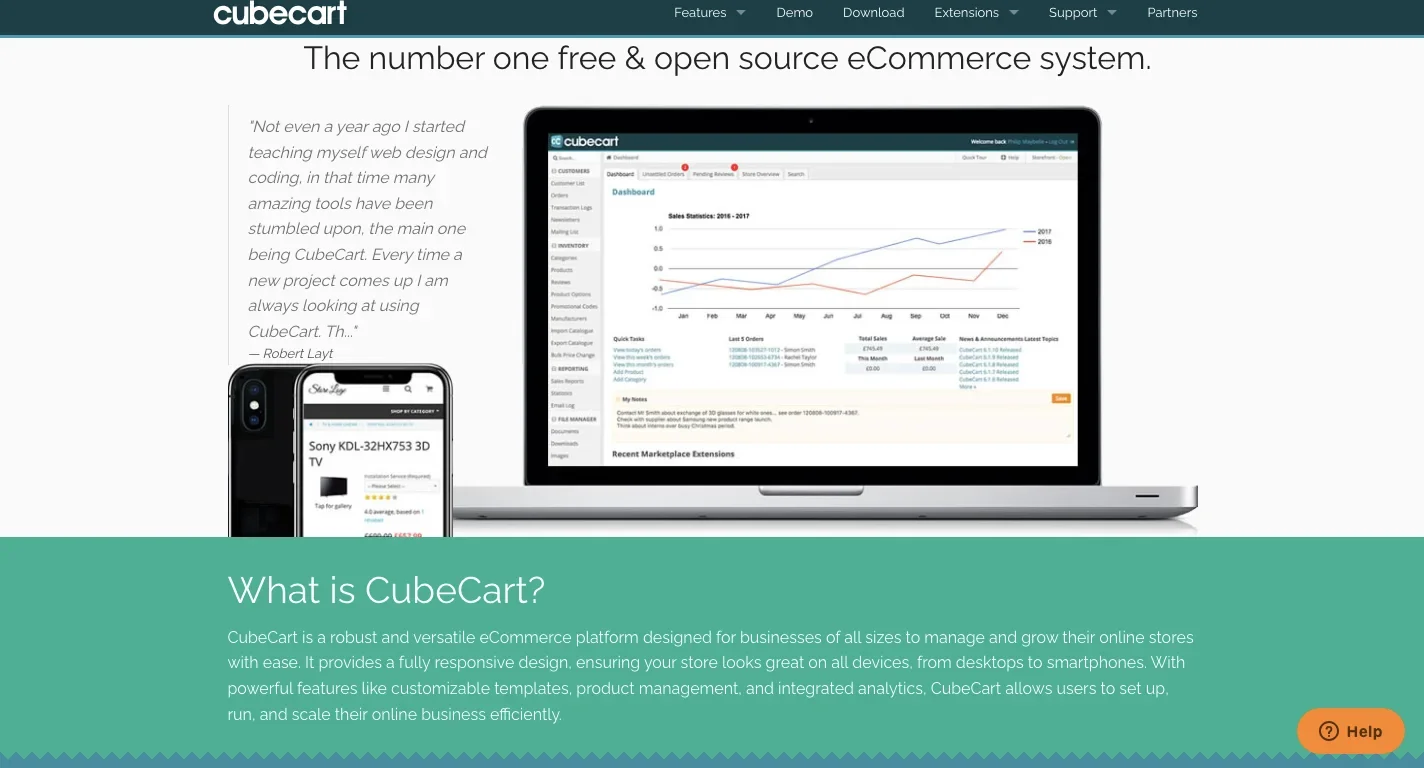
CubeCart offers unparalleled flexibility and customization options. With CubeCart, merchants can easily create online stores to sell digital or physical products. The platform is renowned for its ease of deployment and customization, as highlighted by satisfied users.
CubeCart stands out because it is committed to providing professional technical support directly from the developers, ensuring merchants receive prompt assistance whenever needed. Additionally, CubeCart offers hosted and self-managed options, allowing merchants to choose the hosting solution that best suits their requirements.
Notable Features of CubeCart
- Open Source License: CubeCart is available under an Open Source (GPL 3.0) license, allowing users to freely access and modify their source code.
- Unlimited Scalability: CubeCart offers unlimited capacity for customers, orders, products, categories, and store administrators, providing scalability for businesses of all sizes.
- Extensive Customization: CubeCart features a 100% template-driven responsive skin powered by the Smarty Template Engine, enabling extensive customization of the store's appearance.
- Comprehensive Functionality: CubeCart includes a wide range of features such as sales reporting, statistics, gift certificates, coupons/vouchers, shipping quotes, catalog import/export, social plugins, newsletter tools, and more, providing a comprehensive ecommerce solution.
CubeCart Pricing Plans
CubeCart has provided a transparent pricing structure since January 2015, where all versions are now open source, requiring no software license key and offered at no cost. Furthermore, CubeCart offers a "Technical Support & Management" plan for customers seeking official support and assistance with store upgrades, ensuring a professional and reliable approach with comprehensive backups conducted before any maintenance work.
5. nopCommerce - Straightforward Setup Process
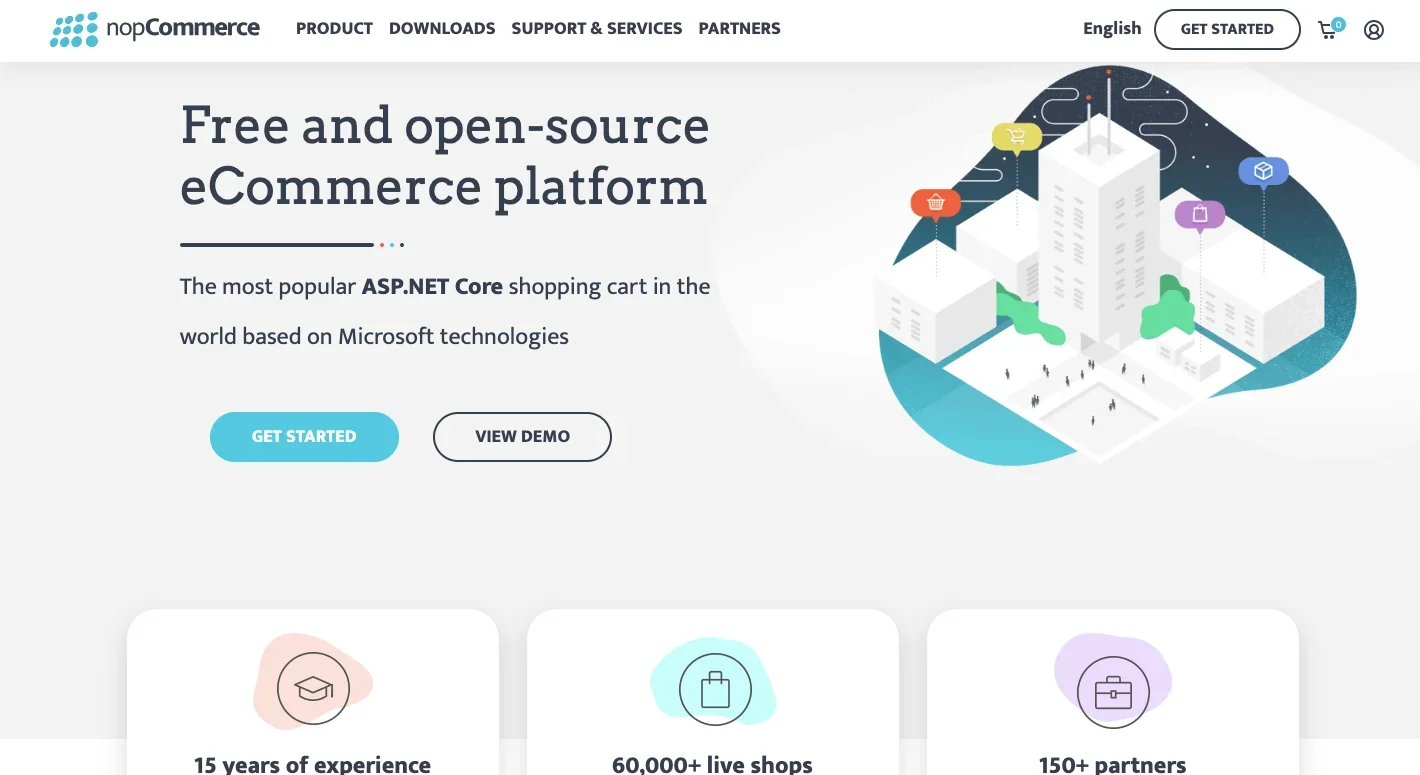
nopCommerce is a premier free ecommerce open source platform, leveraging Microsoft technologies to offer a robust shopping cart solution built on ASP.NET Core. Boasting 12 years of experience in the eCommerce market, nopCommerce has garnered immense popularity, with over 60,000 live shops and 10,000 new stores added annually.
What makes nopCommerce unique is its versatility, catering to businesses of all sizes and types. For small and medium businesses, nopCommerce provides a seamless launch and scaling experience with rich built-in functionality. For enterprise businesses, nopCommerce offers multi-vendor and multi-store functionality, catering to B2B and B2C needs.
Notable Features of nopCommerce
- Absolutely Free: nopCommerce is free to use, with no transaction fees, monthly fees, or hidden charges, making it an accessible option for businesses of all sizes.
- PCI DSS Compliant: NopCommerce complies with PCI DSS (Payment Card Industry Data Security Standard), ensuring that it meets all security requirements for various types of businesses and providing peace of mind for handling sensitive payment information.
- Unlimited customization: nopCommerce offers unlimited customization options as it is open-source, allowing users to tailor their ecommerce stores according to their specific needs and preferences without being limited by built-in functionality.
- Great support: nopCommerce provides excellent support through its dedicated team and active community, ensuring users can access assistance and guidance whenever needed, contributing to a smooth and efficient ecommerce experience.
nopCommerce Pricing Plans
nopCommerce offers a straightforward pricing structure with no paid edition – all features are entirely free of charge. Store owners benefit from seamless customization capabilities, including the ability to modify logos, names, and more directly from their admin access, ensuring a tailored and user-friendly e-commerce experience.
6. Ecwid - Quick and Simple Setup
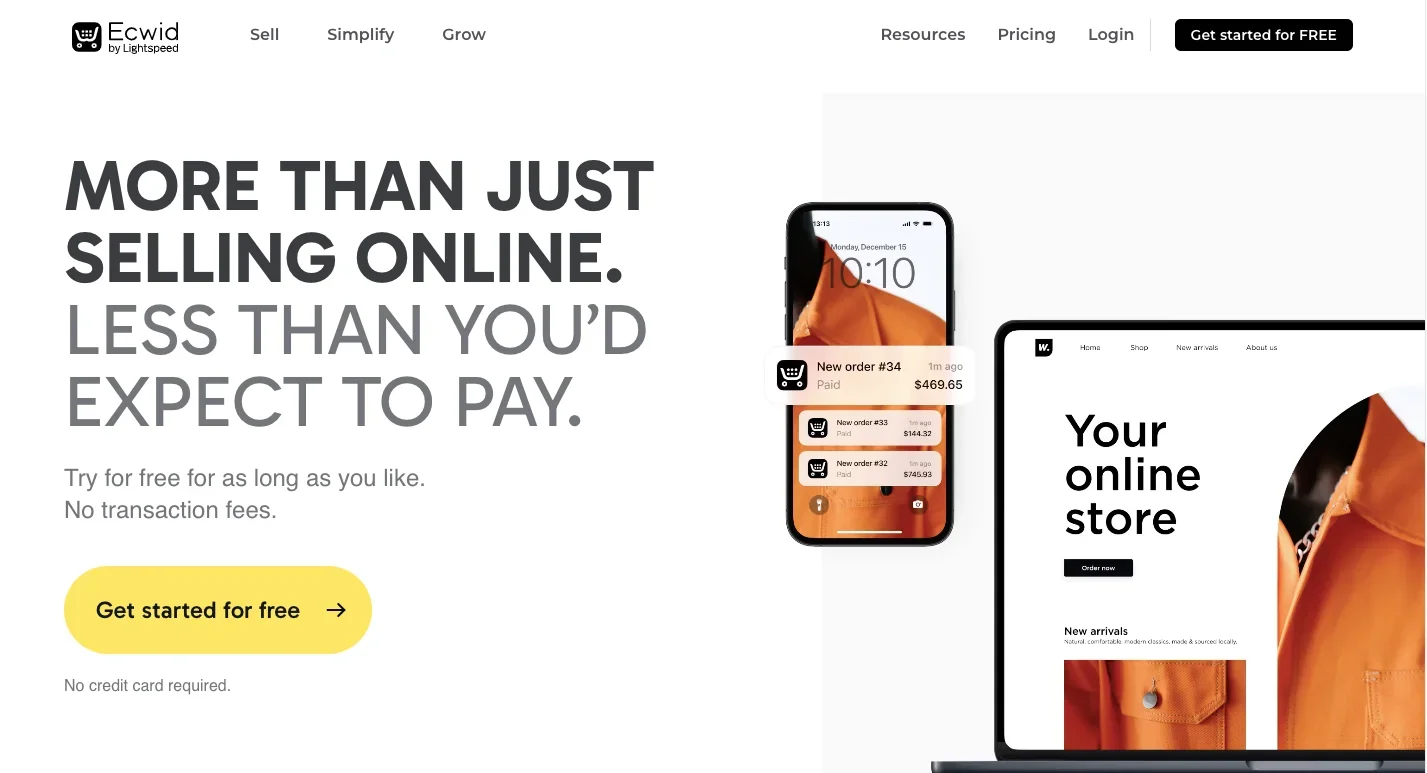
Ecwid offers a comprehensive solution for businesses aiming to establish a solid online presence and reach a wider audience. With its user-friendly platform, merchants can effortlessly sell anything, from products and services to digital goods and subscriptions, without coding or technical expertise.
What sets Ecwid apart is its unparalleled flexibility and accessibility. Merchants can seamlessly sell across multiple channels, including social media platforms like Facebook, Instagram, and TikTok, as well as online marketplaces like Amazon, eBay, Walmart, and Google Shopping.
Notable Features of Ecwid
- Automated Task Management: Ecwid simplifies store management by automating tasks and integrating new tools to help users save time and resources.
- Flexible Integration: Users can connect to their customers' favorite payment and shipping options from over a hundred integrations, enhancing convenience and choice for both sellers and buyers.
- Customizable Store Appearance: Ecwid allows users to customize the look of their catalog, checkout page, and customer notifications without coding, offering flexibility in branding and design.
- Mobile Management: With Ecwid's top-rated mobile app available for iOS and Android, users can conveniently manage orders, products, promotions, and customers on the go, ensuring efficient business management from anywhere.
Ecwid Pricing Plans
Ecwid offers a variety of pricing plans tailored to suit different business needs, including options for a paid version or premium plan that provides full access to advanced features and functionalities. Here are the packages available:
- Free Plan $0: This forever-free plan lets you launch your online store quickly. It includes basic features like creating a store, selling up to 100 products and more.
- Venture $19/month: In addition to everything in the Free plan, the Venture plan allows you to sell up to 100 products.
- Business $39/month: This plan includes everything in the Venture plan, plus the ability to sell up to 2500 products.
- Unlimited $99/month: The Unlimited plan offers everything in the Business plan, along with the ability to sell unlimited products.
Best for Advanced Customization
For those seeking advanced customization options to tailor their online stores to specific needs, choosing the right ecommerce open source platform is essential. Below, we’ve compiled the ecommerce open source platforms that are best for advanced customization.
7. Spree Commerce - Versatile Framework for Customization
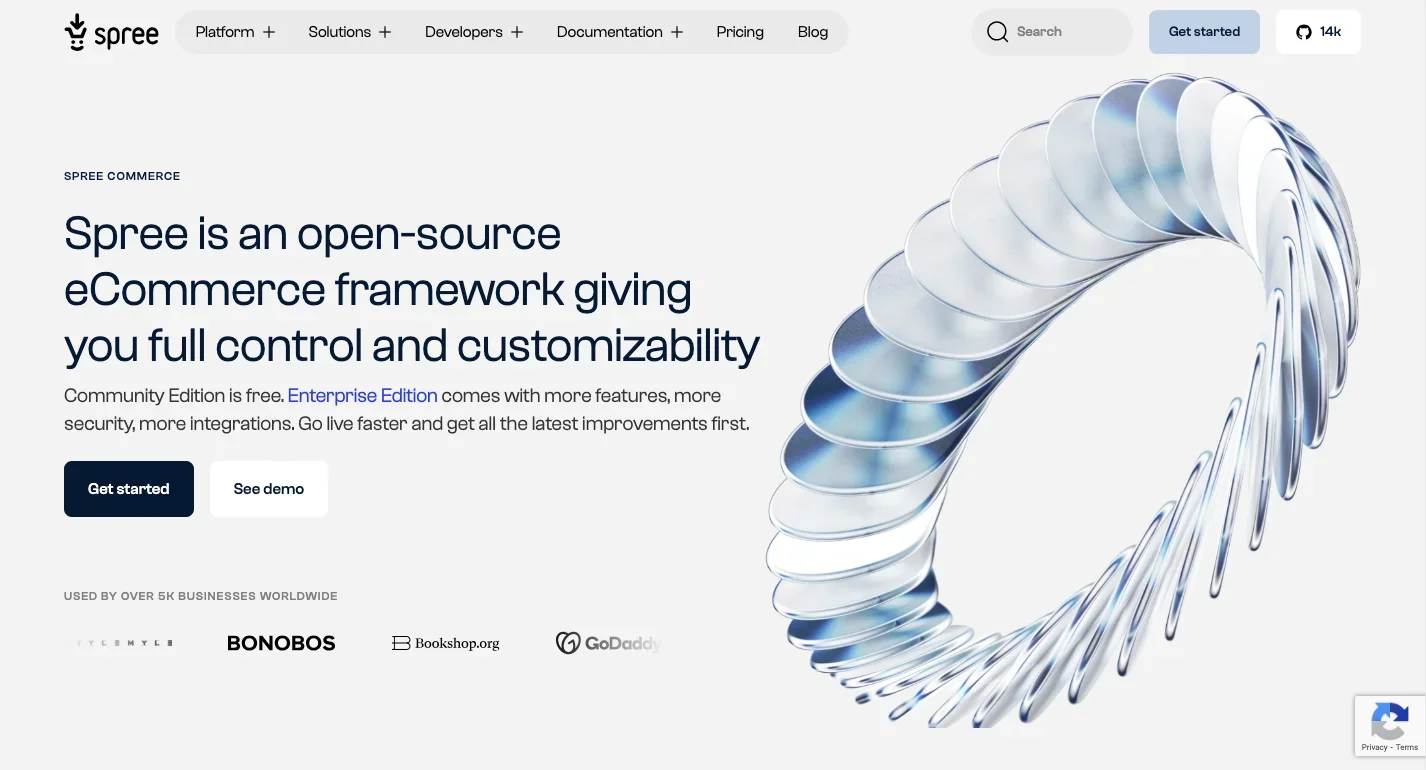
Spree Commerce is a versatile and robust ecommerce open source platform offering a range of key features designed to meet the diverse needs of businesses worldwide. With its built-in storefront and headless architecture, Spree Commerce offers a seamless and customizable shopping experience across various channels.
What sets Spree Commerce apart is its ability to run anywhere, making it a versatile solution for businesses of all sizes and industries. Whether through its comprehensive API with SDKs or its compatibility with various hosting environments, Spree Commerce offers unparalleled flexibility and scalability.
Notable Features of Spree Commerce
- Any Currency, Any Language: Spree Commerce supports any combination of currencies and languages, allowing businesses to seamlessly cater to diverse global audiences.
- Any Payment Method: Spree Commerce enables businesses to accept payments using a wide range of methods, including credit/debit cards, digital wallets (e.g., Apple Pay, Google Pay), bank redirects, and "buy now, pay later" options, ensuring flexibility to meet diverse user needs.
- Any Shipping Method: Spree Commerce offers flexibility in shipping by allowing users to check shipping rates, purchase and print shipping labels, verify addresses, and track shipments with major shipping companies like USPS, UPS, DHL, and FedEx.
- Any Third Party Integration: Spree Commerce facilitates seamless integration with any third-party service, directly or through platforms like Segment.com, enabling users to collect and unify user-centric data.
Spree Commerce Pricing Plan
Spree Commerce is a free ecommerce open source platform offering limitless benefits to its users. With its modular architecture, users can add, configure, or replace any functionality, empowering them to create their online store precisely as desired. This versatility ensures that Spree Commerce meets the unique needs of each business.
8. Drupal Commerce - Extensively Customizable Platform
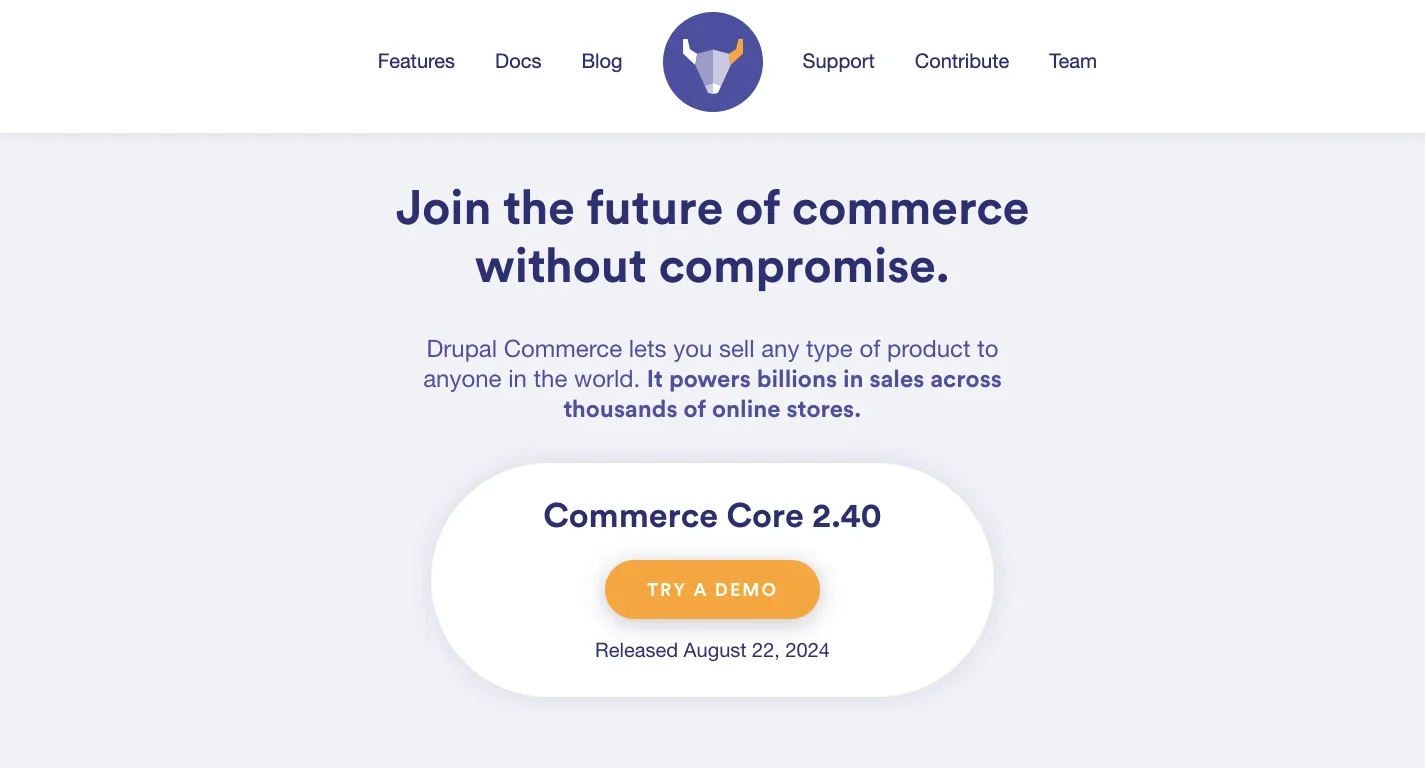
Drupal Commerce revolutionizes the world of online commerce by offering a future-proof solution without any compromises. This robust platform empowers merchants to sell any product to a global audience, facilitating billions in sales across numerous online stores.
One of the standout features of Drupal Commerce is its ability to design rich product display pages that inform and convert customers effectively. Leveraging Drupal's powerful Search API, merchants can build powerful search interfaces for keyword search, category browsing, and facet-based filtering, enhancing the overall shopping experience.
Notable Features of Drupal Commerce
- Adaptable: Drupal Commerce is highly adaptable, allowing businesses to scale and explore new sales models easily. Its modular approach enables business logic and layout changes as the business evolves.
- Built for Growth: Drupal Commerce scales seamlessly with businesses, leveraging Drupal's robust infrastructure to support high traffic and large transaction volumes.
- Headless Ecommerce Platform: Drupal Commerce offers headless commerce capabilities, allowing users to build a backend provider via JSON: API or custom REST resources and use any front-end library to create tailored applications.
- Integrated and Global: Drupal Commerce supports international currency, tax, and language needs out of the box. It integrates seamlessly with third-party services for payment gateways, fulfillment, accounting, social networks, and more.
Drupal Commerce Pricing Plan
Drupal Commerce is a free and ecommerce open source platform integrated with the Drupal content management system. It provides businesses with a highly flexible and feature-rich solution for establishing online stores and effectively selling items and services over the Internet.
How To Choose The Best Ecommerce Open Source Platform
When selecting the ideal ecommerce open source platform for your online shop, navigating the myriad options can be overwhelming. Here's a guide to help you navigate the selection process and choose the best platform that aligns with your business goals and requirements:
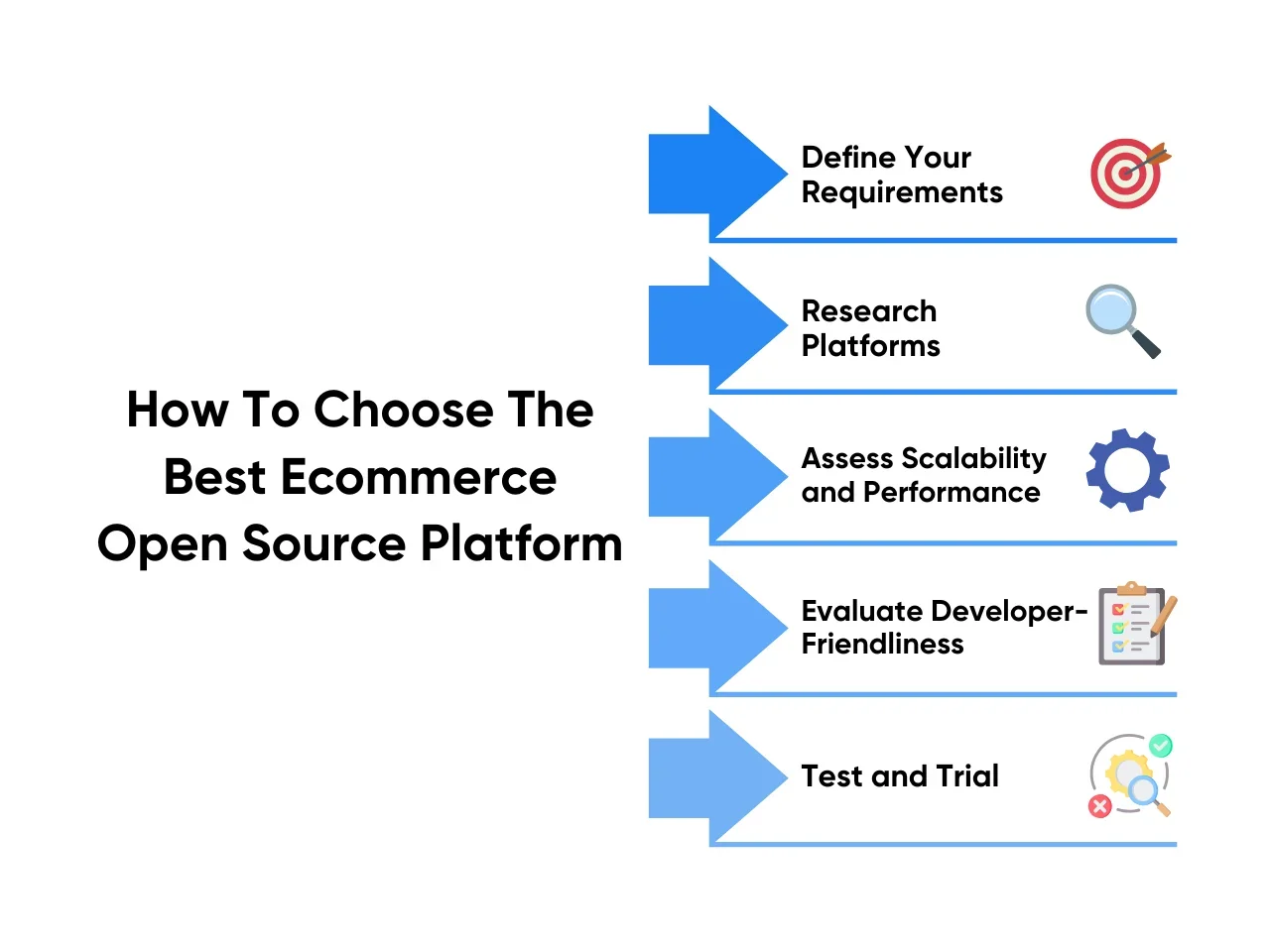
Step 1: Define Your Requirements
Begin by meticulously defining your online business requirements and objectives for the ecommerce platform. Consider various factors such as the size and type of your business, the intricacies of your target audience, your diverse product range, and the specific features and functionality you envision for your online store.
As a business owner, it's essential to envision how these elements will come together to create a cohesive and engaging online shopping experience for your customers, ultimately contributing to the success of your live stores.
Step 2: Research and Compare Platforms
Conduct thorough research on various open source ecommerce options available in the market to identify the better option that aligns with your business needs. Consider visiting the official websites of these platforms to gather detailed information and evaluate their suitability for your ecommerce requirements.
When comparing platforms, consider the following key points:
- Features: Evaluate each platform's features to ensure they meet your specific business requirements.
- Customization Options: Assess the customization options to tailor the platform to your brand's unique needs and design preferences.
- Security Measures: Look into the security measures implemented by each platform to safeguard your customers' data and protect against cyber threats.
- Developer-Friendliness: Consider the platform's ease of use and support for developers, including comprehensive documentation and developer tools to streamline customization and maintenance tasks.
Step 3: Assess Scalability and Performance
Moving forward, it's imperative to thoroughly assess each platform's scalability and performance capabilities to ascertain its ability to handle your current business requirements and future growth projections. Delve deep into features like optimized code, robust caching mechanisms, and comprehensive support for scalable architectures.
Additionally, prioritize platforms that offer built-in Search Engine Optimization (SEO) tools to ensure your online store ranks well. It attracts organic traffic, further enhancing the growth potential of your scalable online store.
Step 4: Evaluate Developer-Friendliness
Consider the developer-friendliness of each ecommerce open source platform, especially if you plan to customize or extend its functionality. This factor is particularly crucial when hiring ecommerce web developers who rely on platforms offering comprehensive documentation.
Features to look for include:
- Comprehensive Documentation: Access to thorough and clear documentation can significantly ease the development process.
- Developer Tools: Availability of tools designed to simplify customization and development tasks.
- Popular Programming Languages and Frameworks: Ensure the platform supports widely used languages and frameworks, facilitating smoother development workflows.
Step 5: Test and Trial
Before arriving at a final decision, allocating time for thorough testing and trialing of the ecommerce platform is essential. This hands-on approach provides invaluable insight into the platform's features and functionality, allowing you to gain firsthand experience of its capabilities. Many ecommerce open source platforms offer a complimentary free version or free trial, allowing you to explore the platform's intricacies comprehensively.
Essential Features of an Ecommerce Open Source Platform
Understanding the essential features of an ecommerce open source platform is fundamental for businesses looking to establish a robust online presence. Here's a breakdown of the key features to consider when evaluating ecommerce platforms:
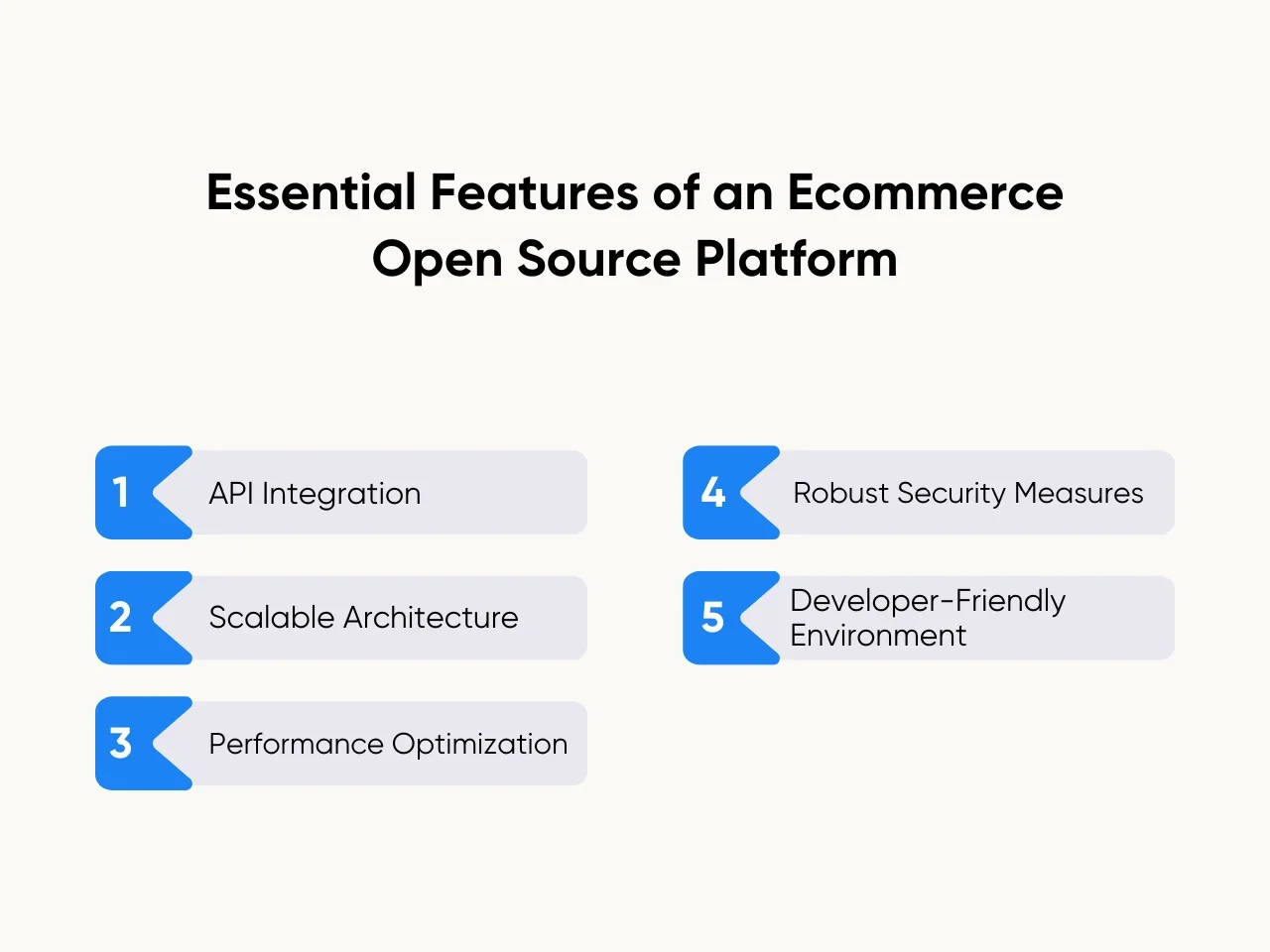
API Integration
Ecommerce platforms should offer robust API integrations to facilitate seamless connectivity with third-party applications and services. This includes integrations with payment gateways, shipping carriers, inventory management systems, and marketing tools. A well-documented and versatile API allows businesses to extend the functionality of their ecommerce platform and integrate with various business systems to streamline operations.
Scalable Architecture
A scalable architecture is crucial for handling fluctuations in traffic and accommodating business growth. Ecommerce open source platforms should employ scalable architecture patterns such as microservices or cloud-native architectures to ensure horizontal scalability. This enables the platform to dynamically allocate resources, scale infrastructure components, and handle increasing workloads efficiently without compromising performance or reliability.
Performance Optimization
Performance optimization features are essential for ensuring fast page load times, smooth navigation, and overall user satisfaction. Ecommerce open source platforms should include caching mechanisms, content delivery networks (CDNs), image optimization, and lazy loading to minimize latency and improve website performance.
Robust Security Measures
Security is paramount in ecommerce to protect sensitive customer data, financial transactions, and business-critical information. Ecommerce platforms should implement robust security measures such as encryption, secure authentication mechanisms, and data encryption in transit and at rest.
Developer-Friendly Environment
A developer-friendly environment is essential for customizing and extending the functionality of an ecommerce open source platform. Ecommerce platforms should provide comprehensive documentation, developer tools, and support for popular programming languages and frameworks.
Key Takeaway
Identifying the top ecommerce open source platforms is not only important but also paramount for businesses aiming to thrive in the competitive online marketplace. These platforms provide a foundation upon which businesses can build their digital storefronts, offering various features designed to enhance the customer experience, streamline operations, and support scalability for future growth.
By carefully considering the unique offerings and capabilities of each platform, businesses can thrive to succeed in the dynamic landscape of ecommerce. Curious about how these ecommerce open source platforms can elevate your ecommerce business?
Explore our ecommerce blogs for deeper insights and trends in 2024. Delve into comparisons, case studies, and expert analyses to make informed decisions and unlock the potential of open-source platforms for your online store in today’s competitive ecommerce landscape!

